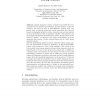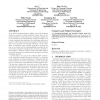68 search results - page 11 / 14 » Ring signatures without random oracles |
EUROCRYPT
2003
Springer
14 years 20 days ago
2003
Springer
Abstract. Digital Signatures emerge naturally from Public-Key Encryption based on trapdoor permutations, and the “duality” of the two primitives was noted as early as Diffie-He...
EUROCRYPT
2010
Springer
13 years 7 months ago
2010
Springer
We investigate the possibility to prove security of the well-known blind signature schemes by Chaum, and by Pointcheval and Stern in the standard model, i.e., without random oracle...
CCS
2004
ACM
14 years 26 days ago
2004
ACM
This paper describes the direct anonymous attestation scheme (DAA). This scheme was adopted by the Trusted Computing Group as the method for remote authentication of a hardware mo...
EUROCRYPT
2004
Springer
13 years 11 months ago
2004
Springer
We introduce Ad Hoc Anonymous Identification schemes, a new multi-user cryptographic primitive that allows participants from a user population to form ad hoc groups, and then prove...
CCS
2010
ACM
14 years 2 months ago
2010
ACM
In an attribute-based signature (ABS), users sign messages with any predicate of their attributes issued from an attribute authority. Under this notion, a signature attests not to...


